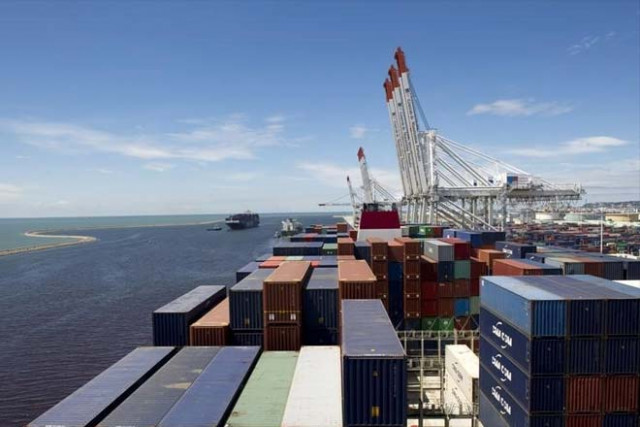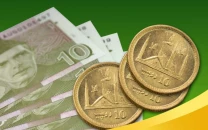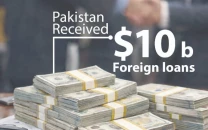Pakistan’s exports on downward trajectory
Pakistan experiencing demand and supply shock due to Covid-19

PHOTO: REUTERS

Exports of Pakistan, which are an important indicator to measure the current account deficit, are on a downward trajectory, showed the Pakistan Economic Survey 2019-20 released on Thursday.
According to the survey, the country recorded export value of $19.7 billion during July-April 2019-20 compared to $20.1 billion in the same period of previous fiscal year, posting a decline of 2.4%.
“However, a sharp fall in the real effective exchange rate arising from the adoption of a market-based exchange rate and government’s initiative to provide cheaper electricity to the textile sector has enhanced competitiveness of Pakistani products in global markets,” it said. The survey document added that imports from July 2019 to April 2020 declined 16.9% to $36.1 billion compared to $40.3 billion in the same period of previous fiscal year.
During July-March FY20, fiscal deficit contracted to 4% of gross domestic product (GDP) while the current account deficit shrank 71%, the survey revealed. Pakistan is experiencing a demand and supply shock due to the Covid-19 pandemic. “There is an improvement of 24% in net exports as these were recorded to be negative Rs2.9 trillion in FY20 compared to negative Rs3.9 trillion last year.”
According to the report, the main reason behind the improvement was that along with macroeconomic stabilisation measures, import demand for a wide range of non-energy and energy products fell significantly.
Furthermore, import declines were observed across all product categories and complemented by lower international prices of most of Pakistan’s principal import commodities.
Efforts have been made to enhance exports, however, international buyers request local entrepreneurs to add value to get a bigger share in the global trade market since Pakistan enjoys the GSP Plus status, which allows exporters to access European markets at concessionary rates.
The share of textile sector in the country’s overall exports during 2018-19 stood at 58.3%. During July-March 2019-20, the share of textile rose marginally to 59.94%, the report said.
The survey stated that exporters faced financial issues due to tax refund claims. The government has released Rs20 billion under the Duty Drawback of Taxes and Drawback of Local Taxes and Levies schemes for the exporters. In addition to these, Rs70 billion worth of tax refunds have been cleared through the Federal Board of Revenue. Speaking at a press conference held to unveil Pakistan Economic Survey 2019-20, Adviser to Prime Minister on Commerce and Industries Abdul Razak Dawood said the country’s exports were becoming diversified.
“Exports are experiencing diversification as exports of pharmaceutical products are rising while meat exports are improving as well,” he said. “China is buying massive cement consignments from Pakistan.”
Dawood added that energy was supplied to the exporters at internationally competitive rates and resultantly export volumes rose. However, textile exporters called it too early to attribute the competitive energy rates to rising exports.
“Competitive rates of energy have been implemented recently, so we cannot say that textile exports have risen due to this reason,” said Pakistan Readymade Garments Manufacturers and Exporters Association (PRGMEA) Patron-in-Chief Ijaz Khokhar while talking to The Express Tribune.
He disagreed with the notion, saying exports were in fact declining. By the time the industry could take benefit of the concessionary energy rates, the Covid-19 pandemic hit the world, resulting in cancellation of export orders, he said.
Published in The Express Tribune, June 12th, 2020.
Like Business on Facebook, follow @TribuneBiz on Twitter to stay informed and join in the conversation.
















COMMENTS
Comments are moderated and generally will be posted if they are on-topic and not abusive.
For more information, please see our Comments FAQ